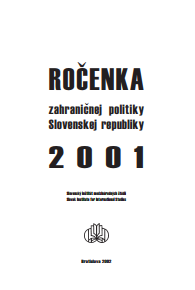
We kindly inform you that, as long as the subject affiliation of our 300.000+ articles is in progress, you might get unsufficient or no results on your third level or second level search. In this case, please broaden your search criteria.

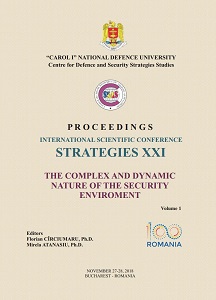
The reality of the widening category of irregular warfare and the raising quantity of radical units all around the world arrived in an unprecedented pace in the 21st century’s security environment. The decisions on designating and labeling „terrorist groups”were always surrounded with terminological debates, diverse state interests, and different perception of security. Thereby handling and countering their attacks and secondary destabilizing effects are hardly-cooperative among larger alliances. Of course, we might not exclude the good examples of international peacekeeping and countermeasures, such as it is happening in the case of ISIS, Al-Qaeda, Al-Shabaab or other specific organizations. But in some cases, the methods of engagement, the continuously shaping security environment, shifts in ideology or other factors should influence the classification of a „terrorist group”, which might be questioned by individuals, ethnic groups, states or the international community itself.This was the situation with the Polisario Front group as well, which in some cases was labeledas terrorist organization, while other papers mentioned it as a separatist group or an organized crime unit. However, in the eyes of the world, the Front still is the legitimate representative of the Sahrawi’s people and a liberating organization responsible for its people. In this analysis,my main aim is to concentrate on these accusations against the Polisario Front, and its actual activity and connections with organized crime groups and highlight the facts, which exclude the Polisario Front from being a terrorist organization.
More...
AQAP, whose original purpose was to overthrow the Saudi monarchy,resulted from the merger with Yemen's Al-Qaeda, in 2009, whose stability was well anchored at national level. Since that period, which corresponds to the weakening of Al-Qaeda's terrorist projects in Pakistan, AQAP has seen an increase in its power and influence. The ability to organize international attacks, to capture Yemeni cities and regions through local groups, or to train foreign fighters, the South-Arab branch of the Al-Qaeda network gets an aura among terrorist organizations at a time when there is an increasing lack of certainty regarding the future of the parent organization.
More...
Geneva Biological and Toxin Weapons Convention (BTWC 1972)provisions must be respected by all signatory countries, while non-signatory countries are required to refrain themselves from using those kind of weapons. BTWC allows signatory countries to possess and use reasonably small amounts of biological agents of war – BAW (grams) for defensive purpose of scientific research for obtaining new means of diagnosis, prevention and treatment. But living biological agents can be multiplied on demand in any amount, or toxins may be bio synthesized in any amount as specific ammunition for biological weapons.It means that the implementation of the Convention is a complex action and difficult to achieve in practice. In this situation, effective legal measures for the worldwide implementation of BTWC must be set, but concrete actions are more difficult to implement. UN, as an international body, is able, to enforce and to monitor the compliance with the Convention, being helped by other entities, such as the Security Council, the World Health Organization (WHO), etc.
More...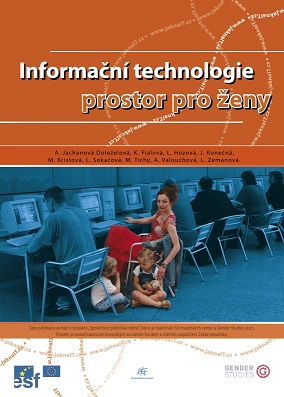

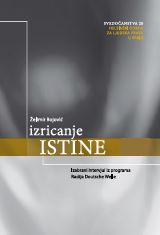
Interview by Želimir Bojević, with: 1. Bošković, Aleksandar 2. Popov, Nebojša 3. Radovanović, Dobrivoje 4. Veljak, Lino 5. Zajović, Staša 6. Stanovčić, Vojislav 7. Golubović, Zagorka 8. Gruden, Tamara 9. Arsenijević, Vladimir 10. Bogosavljević, Srđan 11. Đorđević, Mirko 12. Lukić, Svetlana 13. Gredelj, Stjepan 14. Simović-Hiber, Ivana 15. Hellman, Matias 16. Lučić-Čavić, Milica 17. Resanović, Aleksandar 18. Biserko, Sonja 19. Savić, Obrad 20. Kandić , Nataša 21. Popović, Đorđe 22. Kovačević-Vučo, Biljana 23. Mlađenović, Lepa 24. David, Filip 25. Perović, Latinka 26. Milosavljević, Olivera 27. Krmpotić, Vesna 28. Milić, Jelena 29. Prpa, Branka 30. Singer, Aca 31. Kovačević, Živorad 32. Janjić, Dušan 33. Pantić, Danijel 34. Barać, Verica 35. Kljajić-Imširović, Jelka 36. Gavanski, Bogdan 37. Matić, Jovanka 38. Tešanović, Jasmina 39. Knežević, Ana 40. Blagojević, Marina 41. Srbljanović, Biljana 42. Jevremović, Zorica
More...
Interviews by Želimir Bojević, with: 1. Goati, Vladimir 2. Gojković, Drinka 3. Milosavljević, Bogoljub 4. Mrvić-Petrović, Nataša 5. Šehić, Vehid 6. Nenadić, Nemanja 7. Ahel, Ivan 8. Ranković, Vera 9. Vujadinović, Dragica 10. Tošić, Desimir 11. Perović, Latinka 12. Cetinić, Goran 13. Samardžić, Nikola 14. Hadžić, Miroslav 15. Golubović, Zagorka 16. Minić, Jelica 17. Stojanović, Dubravka 18. Trkulja, Jovica 19. Mappes-Niediek, Norbert 20. Mitrović, Andrej 21. Radić, Radmila 22. Stevanović, Aleksandar 23. Mihailović, Srećko 24. Kuljić, Todor 25. Milenov, Alexandra 26. Delević-Đilas, Milica 27. Beč-Neumann, Janja 28. Kovačević, Marko 29. Trgovčević, Ljubinka 30. Prokić, Nenad 31. Biserko, Sonja 32. Popović, Srđa 33. Stamenković, Stojan 34. Kandić , Nataša 35. Miočinović, Mirjana 36. Stojiljković, Zoran 37. Prokopijević, Miroslav 38. Bogosavljević, Srđan 39. Kovacs-Cerović, Tünde 40. Milivojević, Snježana 41. Vodinelić, Vladimir V. 42. Đogović, Saša 43. Čupić, Čedomir 44. Podunavac, Milan 45. Lukić, Svetlana 46. Vučo, Aleksandar 47. Rak, Pavle 48. Popović-Obradović, Olga 49. Nosov, Andrej 50. Radunović, Desanka 51. Lazić, Mladen 52. Bugarski, Ranko 53. Korać, Nada 54. Rajčić, Biserka 55. Nikolić-Solomon, Dragana 56. Kovačević-Vučo, Biljana 57. Vukomanović, Milan 58. Bugarinović, Nebojša 59. Lilić, Stevan 60. Lukšić-Orlandić, Tamara 61. Timotić, Milorad 62. Stojanović, Lazar 63. Baucal, Aleksandar 64. Milić, Jelena 65. Havelka, Nenad 66. Jakšić, Božidar 67. Lyon, James 68. Ivanišević , Bogdan 69. Licht, Sonja 70. Stambolović, Vuk 71. Rajić, Ljubiša 72. Rakić-Vodinelić, Vesna 73. Daničić, Richard 74. Petrović, Vesna 75. Gajin, Saša 76. Šikman, Siniša 77. Jovanović, Ivan 78. Todorović, Dragoljub 79. Pančić, Teofil 80. Nikolić-Ristanović, Vesna 81. Čanak, Branislav 82. Jevremović, Petar 83. Barać, Verica 84. Ilić, Mirko 85. Matković, Gordana 86. Miletić, Goran 87. Turajlić, Srbijanka 88. Jauković, Milena 89. Miljanić, Ana 90. Vejvoda, Ivan 91. Trifunović, Zorica 92. Gačić-Bradić, Dušanka 93. Popadić, Dragan 94. Bjelić, Dušan Ilija 95. Logar, Svetlana 96. Mandić-Rigonat, Tanja 97. Savić, Obrad 98. Toma, Marijana 99. Jovanović, Miroslav 100. Svilanović, Goran
More...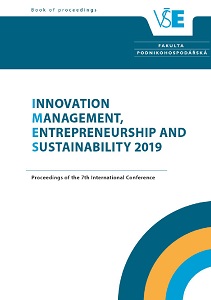
Purpose: The main aim of our study was to contribute to this increasing body of the regional entrepreneurship literature by a better understanding of the regional entrepreneurial activity in Slovakia as an example of post-communist economy. Design/methodology/approach: We exploit the existing measures of entrepreneurship from Global Entrepreneurship Monitor and Statistical Office of the Slovak Republic, and we explore the inter-regional differences in the levels of entrepreneurial activity among eight Slovak NUTS 3 regions during years 2011-2015. We also employ the multivariate regression models and empirically investigate the relationship between the business environment and entrepreneurial activity in Slovakia. Findings: The average engagement in entrepreneurship in Slovakia was during the analysed period 16-18% of the economically active population depending on the measure used. The results of multivariate regression models have shown that the overall improvement of the general business environment positively influences the levels of entrepreneurship in Slovakia. Research/practical implications: We believe that such an observation may serve as an encouragement for the further efforts invested in improving business conditions for the established and new Slovak entrepreneurs. We also encourage future researchers to study further other location factors of entrepreneurial activity such as cultural, logistic and socioeconomic variables. Future research might also address the role of entrepreneurial infrastructure and public entrepreneurship and SME policies. Originality/value: The presented study empirically contributes to the body of knowledge on the regional entrepreneurship and the conducted approach towards quantification of the entrepreneurial activity might serve as an inspiration for other scholars.
More...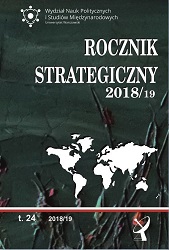
In 2018, even though Vladimir Putin’s mandate was formally confirmed ina presidential election, his approval ratings fell significantly, particularly becauseof his highly unpopular decision to raise the retirement age substantially. Thedecision was one of the ways of seeking savings and building reserves in case theeconomic situation became worse as a result of multiplying American sanctionsand changes in the energy resources market. It was a challenge for the Kremlin, andthe Russian government looked for a way to strengthen the political legitimacy ofPutin’s rule while trying to keep their foreign policy directions unchanged withoutunduly escalating the conflict with the US. Russia attempted to make use of growingtransatlantic tensions while looking to normalize its relations with the main WesternEuropean countries and tightening its unequal anti-American quasi-alliance withChina.
More...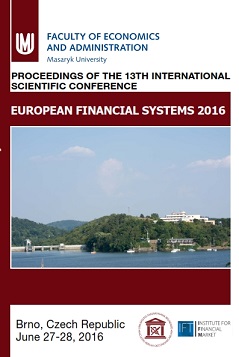
The article "Accrual accounting in the Great Britain army - clarity, transparency, and easy accounting data analyze" analyzes the application of the accrual accounting and resulting consequences of the introduction of resource accounting and budgeting in the Great Britain Armed Forces. The analysis was based on the selected financial statements: Summary of Resource Outturn; Operating Cost Statement, Balance sheet. The horizontal analysis was used to analyze trends of the changes on the annually managed expenditure limits during the period of RAB implementation. The Great Britain army was monitored as a business. Analyzed reports show data for the current and last year. Using data from individual years there was calculated the increase in absolute terms and as well as in percentage terms (growth rate). The original absolute data from financial statements are monitored in certain contexts. Analysis of the trends examined the changes of absolute indicators over time. Change is expressed in percentage or index. How many units of the item has changed over time? (Absolute change) and how many percent of the item has changed over time? (Percentage change). In the horizontal analysis we measured the development of selected items of expenditure limits and capital resources (Resource / Capital DEL) and Annually managed expenditure (AME).
More...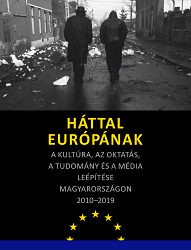
This report has been prepared by independent Hungarian intellectuals who wish to inform the Hungarian and international public as well as European institutions about the severe harm that the Orbán regime governing Hungary since 2010 has caused in the fields of education, science, culture, and the media. The reason for preparing the present report is that the acts of the successive Orbán governments consistently run counter to and consciously violate the fundamental principles, values, and norms of the European Union, not only as regards the rule of law and political and social rights, but also in the case of the cultural areas discussed here. In Hungary, important European values are being jeopardised, including cultural diversity, scientific and artistic autonomy, the respect for human dignity, access to education and culture, conditions for social mobility, the integration of disadvantaged social groups, the protection of cultural heritage, and the right to balanced information, as well as democratic norms like ensuring social dialogue, transparency and subsidiarity. By presenting the activities of the Orbán regime in the fields of culture, education, research, and the media, we provide information about areas little known to the international public. With our report, we wish to draw attention to the fact that an autocratic system has been constructed and consolidated in Hungary with the money of EU taxpayers and with the financial and political support of EU institutions. This system creates a worrying democratic deficit and severe social problems, while it also causes irreparable harm in the fields of education, science, and culture. The authors of the report are leading researchers, lecturers, and acknowledged experts, including several academicians, professors, heads of departments, and a former Minister of Culture. The undertaking was initiated and coordinated by the Hungarian Network of Academics
More...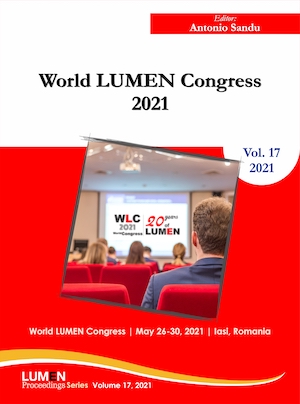
Corruption is a particularly dangerous scourge, which encompasses the whole of society, all spheres of human activity, and by virtue of this, it also encompasses education, whether we want to recognize it or not.Corruption flourishes in times of great social unrest, in times of crisis that societies are going through, especially in the period of transition from a totalitarian regime to a democratic society.The factor generating corruption is the socio-economic crisis, having as causes: weakening of state authority, degradation of living standards, altered moral judgment, lack of effective control levers, diminished public confidence in institutions and social values, non-adaptation of legislation to economic and social conditions and so on Sport is one of the largest businesses in the world, being influenced and influencing in turn both financial and political interests. Every year, millions of dollars and Euros circulate in this area, most of the transactions and agreements taking place behind closed doors, in order to keep any possible advantage over the competition. This fierce competitiveness, together with the lack of transparency, makes the sports field extremely vulnerable to corruption acts.Summarizing the results of our study, we can conclude: the fight against corruption is an opportunity for beneficiary institutions, which can strengthen and improve their systems for preventing and combating corruption and money laundering and asset recovery, by reference to worldwide first-class practices and standards. Following intense consultations with all beneficiaries in the Republic of Moldova: Minister of Education, Culture and Research, National Olympic and Sports Committee, Paralympics’ Committee, Sports Federations and other structures in the country, in order to ensure effective support in the field of physical culture and sports. The direct relations with the interested actors contribute to the creation of a positive framework, which will favour the general success of the future activities that will take place in obtaining the expected results.
More...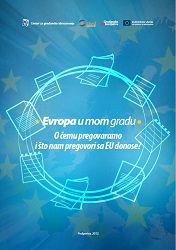
Put evropskih integracija Crne Gore i rad na zaživljavanju vrijednosti razvijenih demokratija koje će doprinijeti uspostavljanju vladavine prava, prate i brojne predrasude. Jedna od njih je vjerovanje da će naši problemi konkretno u ovom poglavlju vezani za vladavinu prava, koju možemo posmatrati i kroz prizmu borbe protiv korupcije i organizovanog kriminala, pa i poštovanje ljudskih prava i sloboda, skoro pa nestati. Predrasuda je i da će se proces EU integracija okončati ulaskom Crne Gore u EU. Predrasuda je da ćemo samo ispunjavanjem preporuka institucije konačno izgraditi u pravcu pune profesionalizacije, depolitizacije, nezavisnosti i samostalnosti. Ali, čitav ovaj proces će nam svakako biti ljekovit i voditi ka uspostavljanju demokratskog društva odgovornih građana i građanki.
More...
Svi napori učinjeni ka harmonizaciji u ovom poglavlju direktno će se održavati na živote građana i građanki Crne Gore, jer se radi o izgradnji sistema koji za cilj ima zakonito, efikasno, efektivno i ekonomično trošenje sredstava poreskih obveznika.
More...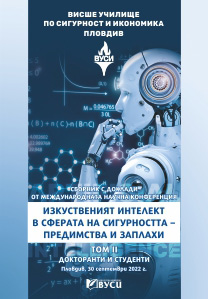
The report looks at basic concepts and aspects related to artificial intelligence in the field of security and corruption. Attention has been paid to the role of artificial intelligence in identifying corrupt officials in individual countries. Examples are given of how artificial intelligence can threaten the national security of the country.
More...
The thesis claiming human progress is directly proportional to technological progress has become a paradigm in modern management. The knowledge of technologies, the degree we use them, the fields it is impossible not to use them, determine not only our quality of life, but also sometimes the possibility of its existence at all. Human potential can unfold on a scale unimaginable until now, thanks to the use of technology to work more efficiently, to connect us with our loved ones and friends, to have fun, to learn, to create. All this is happening in a twinkling of an eye, thanks to technology. That is why there is almost no area of human life they do not take an important place or are absolutely necessary. In this context, their importance is equally significant for public administration and local government.
More...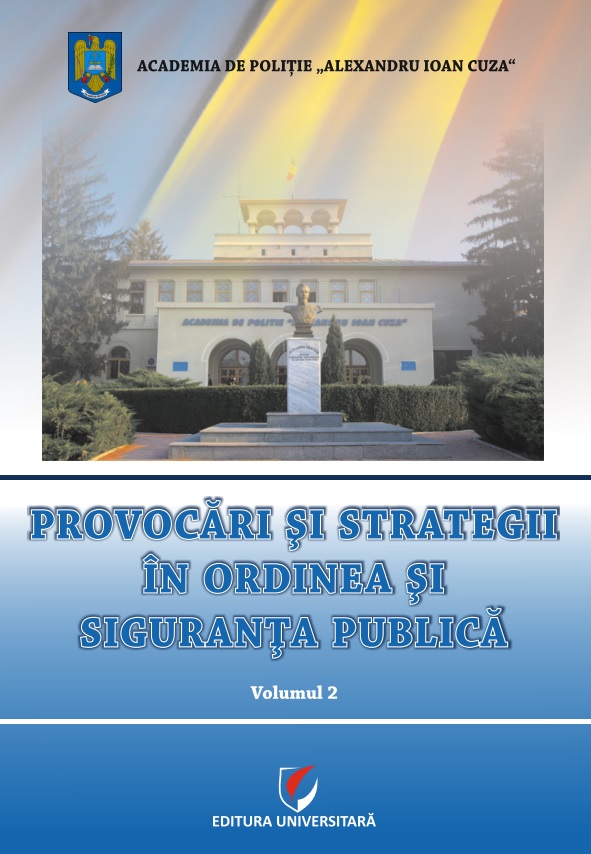
This article proposes an in-depth analysis of the complex relationship between corruption, consciousness calibration, and its impact on the safety of the penitentiary system. Corruption, as a social phenomenon, entails the abusive use of power for personal gain and the acquisition of illegal advantages. The degree of corruption can be influenced by the level of consciousness among personnel, determined by ethical, moral, and cognitive factors. By employing contemporary paradigms such as social systems theory and the ethics of behavior paradigm, the complex mechanisms through which corruption interacts with the development and calibration of individual and collective consciousness are explored.In this context, the importance of education, training, and monitoring processes for professional integrity within the penitentiary system is highlighted, with the aim of fostering calibrated, ethical, and responsible consciousness. Additionally, the influence of corruption on the level of consciousness among personnel is revealed through complex psychological mechanisms such as cognitive justification and distortion of moral norms.To counteract the phenomenon of corruption and ensure the systematic safety of penitentiaries, an interdisciplinary approach is necessary, integrating knowledge and perspectives from the fields of social psychology, sociology, and ethics. The implementation of policies and strategies aimed at developing a higher level of consciousness and promoting a favorable institutional climate for integrity becomes crucial in strengthening and consolidating the Romanian penitentiary system, as well as facilitating the rehabilitation and reintegration of inmates into society.
More...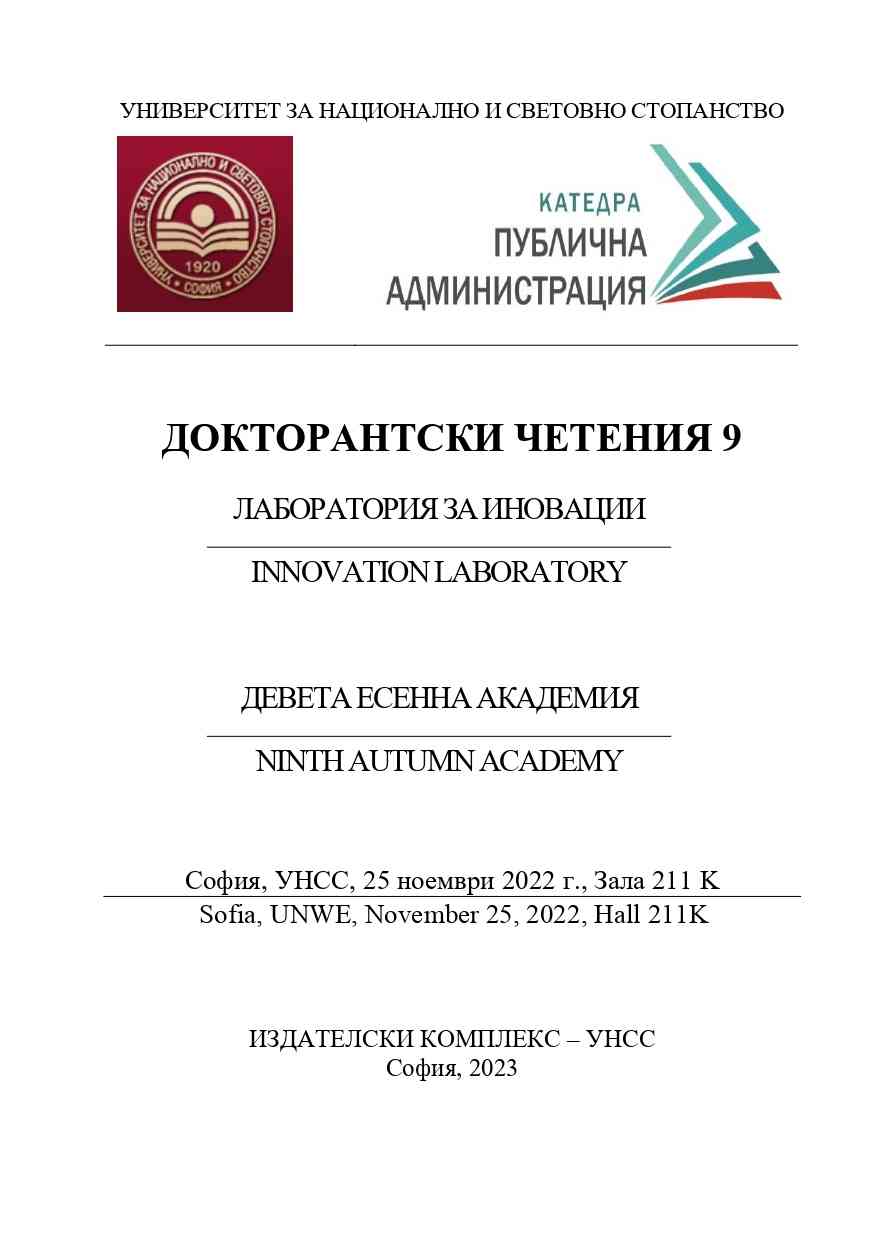
In our society, in the last few years, "Corruption" is among the most frequently mentioned words. The presence of corruption, the perception of it and its consequences are visible to all of us. It is a social phenomenon, and the fight against it involves many different measures and mechanisms. The purpose of this article is to examine precisely those methods of fighting corruption, implicated into the legislative framework of Bulgaria. The main emphasis is placed on the anti-corruption law bill, as the fundamental normative act in this field.
More...